|
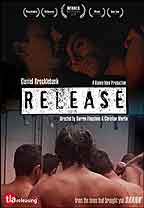
Release
TLA
Releasing,
2010
Director/Screenplay:
Darren Flaxstone,
Christian Martin
Starring:
Daniel Brocklebank, Garry Summers, Bernie Hodges, Wayne Virgo, Dymphna
Skehill, Simon Pearce
Unrated,
87 minutes
|
Crosses
And Cellblocks
by
Michael D. Klemm
Posted online February, 2011
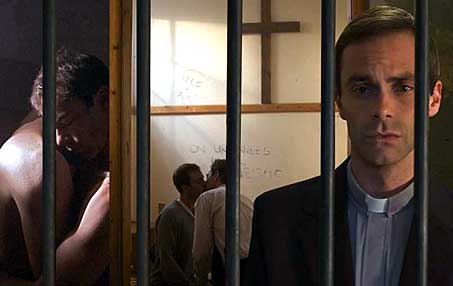
From
Darren Flaxstone and Christian Martin, the British team that brought us
last year's Shank,
comes 2010's Release. This
is an interesting, if jumbled, prison movie that is certainly ambitious.
This provocative film pushes more than a few envelopes but, ultimately,
it tries to wear a few too many hats in the process.
|
|
 Daniel
Brocklebank stars as Father Jack Gille, a young and terrified gay priest
who is adjusting to his new life as a prison convict. Upon arrival, he
is told that he has "the look of a saintly pervert " by a rough looking
prisoner who spits in his face. Because Jack is a disgraced priest, the
other prisoners assume that he is a pedophile. (That is most likely what
the audience will think at first too, but a very different reason for
his arrest is revealed at the film's mid-point.) There's a pecking order
in any prison and child molesters are traditionally treated like scum
even by the most hardened criminals. Daniel
Brocklebank stars as Father Jack Gille, a young and terrified gay priest
who is adjusting to his new life as a prison convict. Upon arrival, he
is told that he has "the look of a saintly pervert " by a rough looking
prisoner who spits in his face. Because Jack is a disgraced priest, the
other prisoners assume that he is a pedophile. (That is most likely what
the audience will think at first too, but a very different reason for
his arrest is revealed at the film's mid-point.) There's a pecking order
in any prison and child molesters are traditionally treated like scum
even by the most hardened criminals.
|
|
 Release
is also a love story between Jack and one of the guards. As the film opens,
they are seen lying in each other's arms. We do not know who they are
yet but we can see, as the camera pulls back, that they are in a prison
cell. The morning alarm bell goes off and Officer Martin Crane (Garry
Summers) leaps out of Jack's cot to hurriedly don his uniform and return
to work before he gets caught. Jack straightens Martin's tie, they kiss,
and the guard runs off. This first scene is an attention grabber. The
storyline of Release is non-linear
and we begin in the middle of the tale and then leap around in flashback
to learn how the two men met and became lovers. It's a bit confusing on
a first viewing but when we finally watch their first fateful kiss, its
tenderness is heartfelt and makes the earth move under our feet. Release
is also a love story between Jack and one of the guards. As the film opens,
they are seen lying in each other's arms. We do not know who they are
yet but we can see, as the camera pulls back, that they are in a prison
cell. The morning alarm bell goes off and Officer Martin Crane (Garry
Summers) leaps out of Jack's cot to hurriedly don his uniform and return
to work before he gets caught. Jack straightens Martin's tie, they kiss,
and the guard runs off. This first scene is an attention grabber. The
storyline of Release is non-linear
and we begin in the middle of the tale and then leap around in flashback
to learn how the two men met and became lovers. It's a bit confusing on
a first viewing but when we finally watch their first fateful kiss, its
tenderness is heartfelt and makes the earth move under our feet.
|
|
 Jack's
quality times with the guard are small bits of heaven but he's still locked
away in prison. He is not having an easy time, and the inmates' leader,
Max (Bernie Doges),
is proving to be a formidable nemesis. This is a typical prison movie
scenario but the offbeat approach to Max's character illustrates the ways
that these filmmakers think outside the box. A more conventional movie
would have made Max a hulking giant with tattoos and maybe an eyepatch.
Instead, he is a smug and quiet man who seems to have raided Mr. Rogers'
wardrobe because he usually dons a wimpy tan sweater. This bizarre touch
actually adds to his menace. Jack's
quality times with the guard are small bits of heaven but he's still locked
away in prison. He is not having an easy time, and the inmates' leader,
Max (Bernie Doges),
is proving to be a formidable nemesis. This is a typical prison movie
scenario but the offbeat approach to Max's character illustrates the ways
that these filmmakers think outside the box. A more conventional movie
would have made Max a hulking giant with tattoos and maybe an eyepatch.
Instead, he is a smug and quiet man who seems to have raided Mr. Rogers'
wardrobe because he usually dons a wimpy tan sweater. This bizarre touch
actually adds to his menace.
|
|
 There
are two other major players in this story. Wayne Virgo (Shank)
plays Rook, Jack's troubled young cellmate. Rook is a former crack addict;
he tosses and turns in his sleep from nightmares about being molested.
Jack befriends him and this makes the kid a target of Max and his goons.
It is when Jack tries to rescue Rook that Martin falls in love with the
priest. The other player is Heather Avery (Dymphna Skehill), the prison's
governess. Warden Avery looks like the SS version of a woman's prison
movie dyke, except that she blatantly ogles all of the male guards. Her
sights are set on Officer Martin until Max informs her that the guard
"worships at a different altar." Max and the Governess seem to have an
understanding and she turns a blind eye when Max tells her that his lads
need to blow off a little steam. There
are two other major players in this story. Wayne Virgo (Shank)
plays Rook, Jack's troubled young cellmate. Rook is a former crack addict;
he tosses and turns in his sleep from nightmares about being molested.
Jack befriends him and this makes the kid a target of Max and his goons.
It is when Jack tries to rescue Rook that Martin falls in love with the
priest. The other player is Heather Avery (Dymphna Skehill), the prison's
governess. Warden Avery looks like the SS version of a woman's prison
movie dyke, except that she blatantly ogles all of the male guards. Her
sights are set on Officer Martin until Max informs her that the guard
"worships at a different altar." Max and the Governess seem to have an
understanding and she turns a blind eye when Max tells her that his lads
need to blow off a little steam.
|
|
 My
response to this film has been complicated and it has proved difficult
to write about. I watched Release
twice. To be honest, it didn't thrill me the first time and I hate the
ending. Even so, I cannot dismiss this movie. There were parts where I
rolled my eyes and parts that I liked, but the good parts don't gel into
a cohesive whole. Characters are underwritten but inbued with quirky little
traits (like the Warden constantly straightening her diploma on the wall)
that stick in the mind. Release
might be lacking in some areas but it is filled with "moments" that engaged
me. My
response to this film has been complicated and it has proved difficult
to write about. I watched Release
twice. To be honest, it didn't thrill me the first time and I hate the
ending. Even so, I cannot dismiss this movie. There were parts where I
rolled my eyes and parts that I liked, but the good parts don't gel into
a cohesive whole. Characters are underwritten but inbued with quirky little
traits (like the Warden constantly straightening her diploma on the wall)
that stick in the mind. Release
might be lacking in some areas but it is filled with "moments" that engaged
me.
|
|
 This
is not an over-the-top guilty pleasure like HBO's prison drama, Oz.
Release strives for more
realism and that is where its problems begin. Corrupt guards are a staple
in prison movies but there are way too many of them here. It's
a bit far fetched that Martin is the only honest guard.(So much
so that the Warden tells him to curb his idealism.) The film's shocking
ending could never happen if this prison had any awareness of
the concept of security. Jack's sentence - 18 months - also seems a bit
light, considering his crime. Also, while we're at it, doesn't any of
the other guards on the night shift notice Officer Martin's absences while
he's frolicking in Father Jack's cell? These are issues of believability
that can't be ignored. I said something earlier about the film wearing
too many hats. Release tries to be too many things: a gritty prison movie;
a forbidden love story; a diatribe against the church's position on gays,
a rumination on faith and its loss. Two failed institutions, both penal
and religious, are the filmmakers' targets. This
is not an over-the-top guilty pleasure like HBO's prison drama, Oz.
Release strives for more
realism and that is where its problems begin. Corrupt guards are a staple
in prison movies but there are way too many of them here. It's
a bit far fetched that Martin is the only honest guard.(So much
so that the Warden tells him to curb his idealism.) The film's shocking
ending could never happen if this prison had any awareness of
the concept of security. Jack's sentence - 18 months - also seems a bit
light, considering his crime. Also, while we're at it, doesn't any of
the other guards on the night shift notice Officer Martin's absences while
he's frolicking in Father Jack's cell? These are issues of believability
that can't be ignored. I said something earlier about the film wearing
too many hats. Release tries to be too many things: a gritty prison movie;
a forbidden love story; a diatribe against the church's position on gays,
a rumination on faith and its loss. Two failed institutions, both penal
and religious, are the filmmakers' targets.
|
|
 The
film's non-linear shape is intriguing but it was probably a mistake to
wait until the middle of the movie before revealing the priest's crime.
Many subliminal flashbacks seem to suggest that Jack was a pedophile
and I fail to see why the filmmakers would not want their audience to
identify with the film's hero from the onset. There will be a scandalous,
yet very sad, revelation concerning Jack's younger brother. The morality
of Jack's actions are subject to debate but he is paying the price
for what he has done. I wasn't expecting a happy ending, and Jack's final
punishment does deliver a powerful finale, but I think his fate
was undeserved. The
film's non-linear shape is intriguing but it was probably a mistake to
wait until the middle of the movie before revealing the priest's crime.
Many subliminal flashbacks seem to suggest that Jack was a pedophile
and I fail to see why the filmmakers would not want their audience to
identify with the film's hero from the onset. There will be a scandalous,
yet very sad, revelation concerning Jack's younger brother. The morality
of Jack's actions are subject to debate but he is paying the price
for what he has done. I wasn't expecting a happy ending, and Jack's final
punishment does deliver a powerful finale, but I think his fate
was undeserved.
|
|
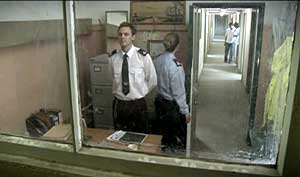 Script
problems aside, Release is
a brilliant exercise in style. The overall mood is grim. Prison scenes
are bleached of color. The camera lingers on the peeling paint along the
ceiling, or prowls through hallways like Stanley Kubrick's steadicam in
The Shining. The soundtrack sometimes just features natural sounds
like dripping pipes and slamming doors. Religious iconography abounds.
The priest's dreams of golden-lit fields, where he sheds his clothes and
runs free, recall the ending of Jean Genet's 1950 homoerotic prison short,
Un Chant d'Amour.
. This, and the love scenes, contrast with scenes of violence that are
brutal, almost unbearably so. (The same was true of Shank.)
There is an assault in the shower that goes on for a long time and then
references Hitchcock's
Psycho by showing blood running down the drain. Script
problems aside, Release is
a brilliant exercise in style. The overall mood is grim. Prison scenes
are bleached of color. The camera lingers on the peeling paint along the
ceiling, or prowls through hallways like Stanley Kubrick's steadicam in
The Shining. The soundtrack sometimes just features natural sounds
like dripping pipes and slamming doors. Religious iconography abounds.
The priest's dreams of golden-lit fields, where he sheds his clothes and
runs free, recall the ending of Jean Genet's 1950 homoerotic prison short,
Un Chant d'Amour.
. This, and the love scenes, contrast with scenes of violence that are
brutal, almost unbearably so. (The same was true of Shank.)
There is an assault in the shower that goes on for a long time and then
references Hitchcock's
Psycho by showing blood running down the drain.
|
|
 The
shower assault is worth discusssing. It features a pile of naked men but
none of them are Calvin Klein models. In fact, anyone who might have harbored
thoughts of being titillated by washroom nudity is in for a shock by the
senseless and ugly brutality of the scene. Forget the excitement, for
example, in the sauna scene that featured Viggo Mortensen's nude fight
to the death in David Cronenberg's Eastern Promises. This is actually
a good thing because I've seen too many queer film catalogues advertise
shower rapes in prison movies as a selling tool. It is a brave, if repugnant,
sequence. The
shower assault is worth discusssing. It features a pile of naked men but
none of them are Calvin Klein models. In fact, anyone who might have harbored
thoughts of being titillated by washroom nudity is in for a shock by the
senseless and ugly brutality of the scene. Forget the excitement, for
example, in the sauna scene that featured Viggo Mortensen's nude fight
to the death in David Cronenberg's Eastern Promises. This is actually
a good thing because I've seen too many queer film catalogues advertise
shower rapes in prison movies as a selling tool. It is a brave, if repugnant,
sequence.
|
|
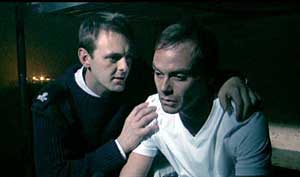 Flaxstone
and Martin understand what makes a film cinematic. There is a very suspenseful
scene in which a guard shines a flashlight through the small window in
Jack's cell door, while the clandestine lovers hide in a corner to escape
discovery. Thir love scenes are major highlights, brimming with both romance
and passion. The scenes are dark, lit with shafts of light. At times their
lovemaking has all the solemnity of a Mass and maybe perhaps the choir
music is a tad overdone. Brocklebank is hot as Father Jack. He's a cross
between Sam Neil and Sting during his days with The Police. But he's too
sexy to be a priest - the man is built, and how many priests have a cool
tribal tattoo like that running over their shoulders and down their backs?
And Officer Martin looks way too friendly and benign to be a prison
guard. But who cares, their interludes together are transcendent. and
provide an idyllic response to the ultraviolence in the rest of the picture. Flaxstone
and Martin understand what makes a film cinematic. There is a very suspenseful
scene in which a guard shines a flashlight through the small window in
Jack's cell door, while the clandestine lovers hide in a corner to escape
discovery. Thir love scenes are major highlights, brimming with both romance
and passion. The scenes are dark, lit with shafts of light. At times their
lovemaking has all the solemnity of a Mass and maybe perhaps the choir
music is a tad overdone. Brocklebank is hot as Father Jack. He's a cross
between Sam Neil and Sting during his days with The Police. But he's too
sexy to be a priest - the man is built, and how many priests have a cool
tribal tattoo like that running over their shoulders and down their backs?
And Officer Martin looks way too friendly and benign to be a prison
guard. But who cares, their interludes together are transcendent. and
provide an idyllic response to the ultraviolence in the rest of the picture.
|
|
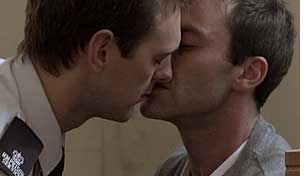 I
watch a lot of queer films. Some of them are so unmemorable that
they blend together and are quickly forgotten. Many of them never get
written about. Release, for
all its faults, will not be forgotten about any time soon. But Release
will be remembered for its parts rather than its whole. I meant it when
I said that these filmmakers think outside the box because the film is
never boring. It is a gutsy film that takes a lot of risks (it's unhappy
ending for one) and, for that, this reviewer is grateful. I
watch a lot of queer films. Some of them are so unmemorable that
they blend together and are quickly forgotten. Many of them never get
written about. Release, for
all its faults, will not be forgotten about any time soon. But Release
will be remembered for its parts rather than its whole. I meant it when
I said that these filmmakers think outside the box because the film is
never boring. It is a gutsy film that takes a lot of risks (it's unhappy
ending for one) and, for that, this reviewer is grateful.
More
on Darren Flaxstone and Christian Martin
Shank
Wayne Virgo and Bernie Hodges also appear in:
Shank
|

